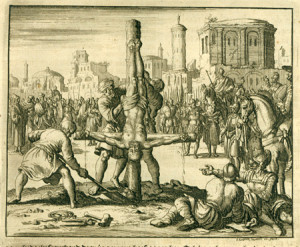
Crucifixion of apostle Peter, Rome, AD 69 (Eeghen 663)
from “Martyr’s Mirror,” illustrations here.
There is no question in my mind that one of the most compelling reasons to believe specifically the accounts of Jesus’ life and teachings is the testimony of those who were there. This is, I’m quite sure, a problematic claim for those who object to faith; I’ve encountered many rants on the unreliability of the gospel accounts, though I find that the same people who protest about the unreliability of the gospels tend to be far more credulous when looking at any other ancient written histories. But there are two particular things about the Apostles and other first-century Christians that I find highly compelling.
The first is specific to the Evangelists who wrote the four canonical gospels (and I really do mean the canonical ones; I’ve read a number of the others and they differ so much in character that the judgment of the councils in rejecting them seems to me quite sound). C.S. Lewis probably said it best in his 1959 lecture “Modern Theology and Biblical Criticism:”
“I have been reading poems, romances, vision-literature, legends, myths all my life. I know what they are like. I know that not one [of the stories in the Gospel of John, for example] is like this… Either this is reportage – though it may no doubt contain errors – pretty close up to the facts; nearly as close as Boswell. Or else, some unknown writer in the second century, without known predecessors or successors, suddenly anticipated the whole technique of modern, novelistic, realistic narrative.” (see the full essay here; quote on p. 155)
Put perhaps a little more simply, the gospels just don’t look like anybody else’s idea of what mythical or divine characters ought to be, do, or say. Weird and off-center as they might seem now, they were even weirder and less-probable in the time they were written. Things only turn out that oddly if they’re either real (truth really is stranger than fiction) or very creatively written.
But even more compelling to me is the fact that the authors and their other compatriots were willing to die for the truth of what they had written or said. And die they did, in some pretty horrible ways. According to tradition and Foxe’s Book of Martyrs (1563):
- Philip was crucified
- Matthew was “slain with a halberd”
- James the brother of Jesus was beaten, stoned, and clubbed to death
- Matthias (elected to replace Judas) was stoned and beheaded
- Andrew was crucified
- Mark was “dragged to pieces”
- Peter was crucified upside-down
- Paul was beheaded
- Jude was crucified
- Bartholomew was beaten and then crucified
- Thomas was speared
- Simon the Zealot was crucified
- John was “cast into a cauldron of boiling oil,” survived, and was later exiled to the island of Patmos; “He was the only apostle who escaped a violent death.”
- Barnabas is said to be martyred, though the means of his death is not reported.
These guys, unlike later generations of Christians killed by the thousands under various rulers, knew exactly what they were dying for. They claimed to have seen and heard it themselves. If they were faking it, they sure were willing to take their deception to a really crazy, extreme end.
I’m not saying that death alone testifies to truth. Many hundreds and thousands have died for falsehoods throughout history … I think of the infamous Jonestown mass suicide in the 70s … but the difference, at least as I see it, is that these people were deluded by a charismatic leader who ordered them to their deaths. Jesus did no such thing, and in fact he was already dead and gone (if we presume fakery) or dead and raised (if we accept the Gospels) before any of the apostles faced their deaths. These men went willingly to gruesome deaths because they couldn’t recant the truth of what they’d spent their lives teaching.
There are, of course, many more martyrs since the first century. While I have no desire to diminish their testimony, it seems to me that it’s of a different category. Except for however they may have experienced the Holy Spirit in their own lives, the thing for which they died was removed from them in that they no longer could testify to having seen Jesus with their eyes, heard his teachings from his very lips with their own ears, and even sat and broken bread with him. No one, however intense their experience, has had the same level of personal, experiential linkage to Jesus Christ that those first-century apostles had. And when they were invited to either confess to their lie or die in pain, they insisted it was no lie and accepted the consequences. Two millenia later, that testimony remains, to me, difficult to refute.

Pingback: We Track a Story People Were Willing to Die For | Thinking Out Loud